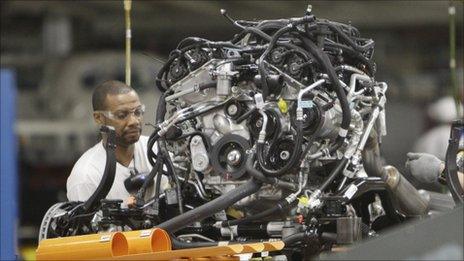US auto industry: The road to recovery?
- Published
- comments

Detroit was the birthplace of the auto-industry but in 2009 it nearly died here. General Motors and Chrysler stood on the brink of bankruptcy, their finance arms busted by the credit crunch, their manufacturing busted by the resulting downturn and massive overhanging pension problems.
But now Detroit has come back to life.
The city, to the visitor, is still a landscape of cold winds, steam-exhaling drains and smashed-up Art Deco buildings.
But it's still the place where the big names of US auto-making work. And after the US government spent $89bn on keeping the two iconic auto giants alive, Detroit is getting back to work.
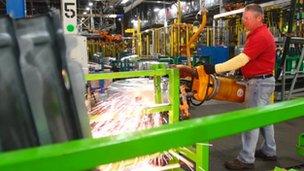
GM worker Brad Glende thought his career was over in 2009
At GM's Lake Orion plant I meet Brad Glende. In 2009 he was made redundant, with thousands of others and, he tells me, thought his 16 year career at GM was over. But after a six-month layoff he was re-hired and has returned to a factory that is very different.
The plant is one big room, the size of 55 football pitches. With the bailout money, GM has ripped out everything that was there before (you can still see the oily marks of the old layout on the floor). And they've re-tooled.
I get Brad to do a bit of spot-welding but, in truth, most of it is done by relentless robots: a car-sized claw picks up an aluminium panel, twists it through the air, zaps it amid a hail of sparks and puts it back into a neat pile, as gently as a mother might lay down a sleeping baby.
There are fewer workers and more robots. But that's not the biggest change. They've adopted, effectively, German and Japanese ways of working, slashed the workforce, massively reduced the number of job-titles and taken a major hit to working conditions and pensions.
In return, the union pension fund got to own 11% of GM's shares.
If it all sounds a bit like a kind of state capitalism, that's what the management are touchy about.
"The bailout saved the whole industry and the government holds its shares just like any other owner - it doesn't interfere," says GM's on-message executive Selim Bingol when I interview him later.
But that's where the politics comes in. Consider this as a headline: "Let Detroit Go Bankrupt". It was an unusually forthright strap in the New York Times, which generally prefers understatement and opacity. It was the banner for an op-ed article written in 2008 by Mitt Romney, external, who is now virtually certain to become the Republicans' presidential candidate.
Romney, whose dad was an automobile man, wrote: "If General Motors, Ford and Chrysler get the bailout that their chief executives asked for yesterday, you can kiss the American automotive industry goodbye."

Some in the US would rather the bailout had not been given the green light
Though unpopular on the shop floor at GM, it's a view still strongly held by senior Republicans. Mitch Daniels, former Bush administration budget chief, told me GM and Chrysler would have been easier to turn around, and at much less cost to the taxpayer, if they'd gone through the traditional bankruptcy route, stripping them of their pension liabilities and debts.
Now this issue is going to play hard in the upcoming presidential election, especially in the northern Mid-west, scattered with bailed-out car plants and their supply chain businesses.
To America, the automobile and the open road have always been symbols of free-market individualism; and on the bumper stickers of the cars there are still the same slogans proclaiming various forms of neo-liberal freedom.
But whether you call it crony capitalism or state capitalism, the auto industry's successful turnaround - GM made a $7bn profit this year - bears the hallmarks of European and Japanese style statism.
And while much of America's recovery remains fragile, halting and uncertain, the turnaround in cities like Detroit, Toledo and the like is tangible, and has much to do with the government's one-off foray into industrial activism.
This is going to be a battle for the heart and mind of the American worker, and the ammunition will be counted in the LED displays that clock the cars, slowly, one by one, off the end of the track at places like Lake Orion.
Watch Paul's full report on the US auto-industry on Thursday 26 April 2012 at 10.30pm on BBC Two, then afterwards on the BBC iPlayer and Newsnight website.
- Published15 April 2012
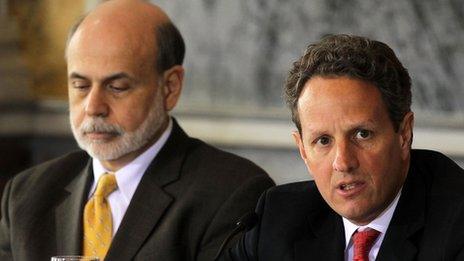
- Published28 February 2012
- Published15 February 2012
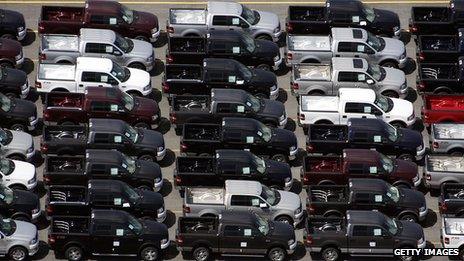
- Published13 January 2012
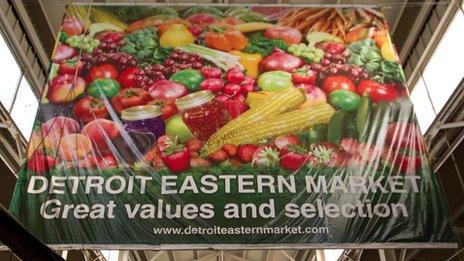
- Published24 May 2011
